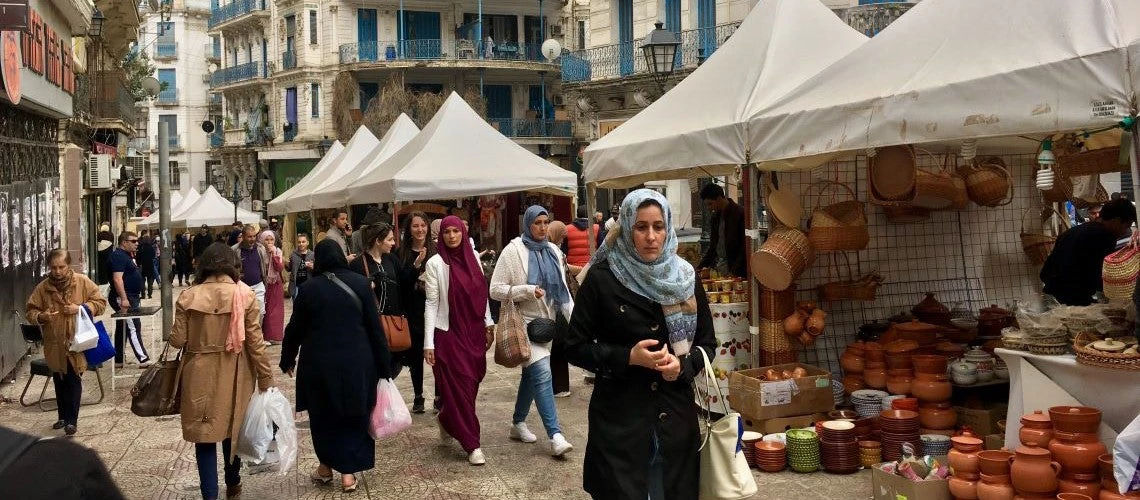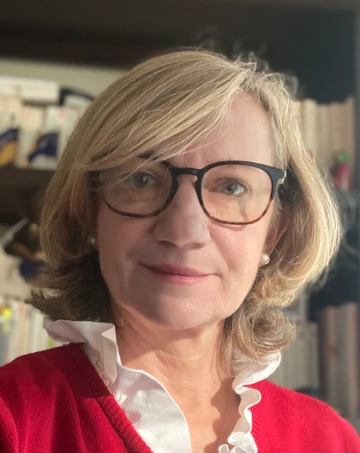 Shoppers walk through a market in Algeria.
Shoppers walk through a market in Algeria.
Managing a business is quite a feat. Particularly in the economic climate created by COVID-19, but even in better times, establishing businesses in Algeria can be an uphill battle. The pre-registration process to start a company alone can take over three weeks, involving numerous steps, from obtaining a certificate (attestation) of the company’s unique name to depositing start-up capital through a notary public and publishing a notice of incorporation.
All this needs to be done to start operating businesses in a formal and fully legal way, without counting separate procedures related to local taxes and social security registration.
Other hurdles then arise once the business is operational: A construction permit can take more than six months. Algerian banks require immovable property as collateral for obtaining loans, but often small and medium-sized entrepreneurs do not own land or buildings. These factors and other regulations affect the profitability and, ultimately, the survival of firms.
Like many other countries around the world, Algeria is working on reforms to improve the business climate. Such reforms are critical to lessen the burden felt by small and medium enterprises (SMEs), which are key drivers of the economy and of employment. In recent years, steps have been taken in that direction, such as improving electricity connections (by streamlining administrative processes) and the granting of new licenses to vendors selling electricity/pre-built substations; enhancing the credit infrastructure through the transmission of data on microcredit to the Bank of Algeria; improving the digitalization of cadastral maps and land titles; and facilitating imports by carrying out joint inspections by customs control.
These steps have been initiated by the Industrial Diversification and Business Climate Improvement Support Program in Algeria (PADICA, Programme d'appui à la diversification industrielle et à l’amélioration du climat des affaires en Algérie), with support from the European Union and the World Bank. With the renewed engagement of the Algerian authorities (in particular the Ministry of Industry and Mines, as the new anchor of the reform process), an extension of the program is being considered.
Although progress has been made, more needs to be done to speed things up. For example, a digital platform has been launched for processing construction permits, but the permit application process still requires a physical visit to a one-stop-shop at the local level: the Communal People's Assembly, Assemblée populaire communale. Likewise, for those seeking to register property, a new platform, Wathikacad, is now operational to consult maps and land titles. Yet, too many plots of land remain untitled, and more work is needed to facilitate the transfer of property through map digitalization. Additional efforts should be made to improve paperless and contactless operations to strengthen digitalized procedures. Progress could also be made regarding digital technologies to complete tax declarations online, make tax payments electronically, and process value-added tax (VAT) reimbursements for Algerian enterprises. Algeria could learn from Central Asian countries such as Azerbaijan, which relies on oil as a source of national wealth while seeking to develop non-oil sectors. Azerbaijan has implemented a set of reforms to facilitate the work of entrepreneurs. For example, by increasing the transparency of land administration and expanding its coverage and digitization, Azerbaijan has made it easier for entrepreneurs to register property. By strengthening digitalization, it has introduced a new e-system for electronic filing of complaints in courts, and taxes can now be paid electronically. Azerbaijan also created a one-stop shop to apply for electricity, and invested in grid infrastructure and established a national regulator to monitor power outages. Lastly, access to credit has been improved through private credit bureaus, and new, secured transactions and insolvency laws have been introduced, broadening the scope of assets that can be used as collateral.
The long-term reform process requires wider political discussion to benefit more market participants and liberate the economy. Improving the corporate governance framework could boost investor interest through capital markets, even though changing the laws applying to this can be a long, arduous process.
The economic impact of COVID-19 has made urgent the need to develop a more friendly business environment in Algeria. Emphasis should be placed on pursuing digitization (e-government) and simplifying procedures for business, whether for registration, obtaining a building permit, or transferring property. The role of the notary should also be reconsidered, eliminating procedures which can now be done electronically. The sooner these actions are taken, the better, as some of these reforms may take a few years to achieve tangible results — especially reforms based on changes in legislation.
Once the reforms are implemented, the next most important step is to conduct a robust awareness campaign to ensure the adherence of entrepreneurs, administration officials, professionals and foreign investors. As the old Roman proverb goes, "Quidquid agis, prudenter agas et respice finem," meaning, whatever you do, do it well and be aware of the results. Algerian entrepreneurs need the right conditions to grow and thrive.



Join the Conversation